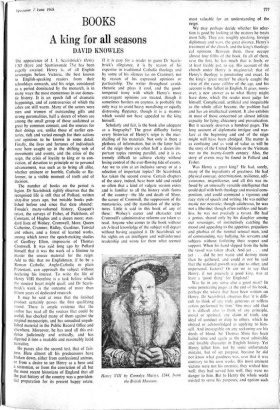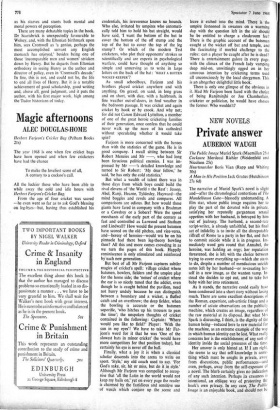A king for all seasons BOOKS
DAVID KNOWLES
The appearance of J. J. Scarisbrick's Henry VIII (Eyre and Spottiswoode 75s) has been eagerly awaited. Henry is, of all English sovereigns before Victoria, the best known to English-speaking readers from their schooldays onwards, and his reign, considered as a period dominated by the monarch, is in many ways the most momentous in our domes- tic history. It is an epoch full of dramatic happenings, and of controversies of which the ashes are still warm. Many of the actors were men and women of outstanding gifts and strong personalities, half a dozen of whom are among the small group of those acclaimed as great by common consent, and the sources for their doings are, unlike, those of earlier cen- turies, rich and varied enough for their actions and opinions to be known in some detail. Finally, the lives and -fortunes of individuals were here caught up in the shifting web of movements and events, and the crisis of the reign, the crisis of loyalty to king or to con- viction, of devotion to principle or to personal advancement, was such as to bring all alike, whether eminent or humble, Catholic or Re- former, to a visible moment of truth and of decision.
The number of books on the period is legion. Dr Scarisbrick rightly observes that the recognised life is still that of Pollard, written sixty-five years ago, but notable books pub- lished before and since that date abound : Froude's many-volumed history, Gasquet's retort, the surveys of Fisher, of Pickthorn, of Constant, of Hughes and a dozen more; stan- dard lives of Wolsey, Cromwell, More, Queen Catherine, Cranmer, Ridley, Gardiner, Tunstal and others, and a forest of learned works, among which tower the epoch-making studies of Geoffrey Elton, impresario of Thomas Cromwell. It was said long ago by Pollard himself that it was the work of a lifetime to master the source material for the reign. Add to this that no Englishman, if he be a Roman Catholic, Anglo-Catholic or plain Protestant, can approach the subject without declaring his interest. To write the life' of Henry VIII therefore is a task before which the stoutest heart might quail, and Dr Scads- brick's work is the outcome of more than fifteen years of dedicated research.
It may be said at once that the finished product certainly passes the first qualifying round. There is ample evidence that the author has read all the sources that could be useful, has checked many of them against the original manuscripts, and has consulted unpub- lished material in the Public Record Office and elsewhere. Moreover, he has used all this evi- dence judiciously and critically, and has digested it into a readable and reasonably lucid narrative.
He passes also the second test, that of fair- ness. Here almost all his predecessors have broken down, either from confessional animus, or from a desire to see Henry as a hero and a statesman, or from the conviction of all but the most recent historians of England that all the past history of the country was a providen- tial preparation for its present happy estate. If it is easy for a reader to guess Dr Scaris- brick's allegiance, it is by reason of his expertise in traditional Catholic theology and by some of his silences (as on Cranmer), not by reason of his expressed opinions or partisanship. The writer throughout avoids rhetoric and plays it cool, and the good- tempered irony with which Henry's more extravagant opinions are treated, though it sometimes borders on coyness, is probably the only way to avoid heavy moralising or equally distressing flippancy, though it is a manner which would not have appealed to the king himself.
Scholarly and fair, is the book also adequate as a biography? The great difficulty facing every historian of Henry's reign is the mar- shalling of his materials. Not only is there a plethora of information, but in the latter half of the reign there are often half a dozen im- - portant topics running parallel, and it is ex- tremely difficult to achieve clarity without - losing control of the ever-flowing tide of events. Are we to aim at an inclusive survey or at a selection of important topics? Dr Scarisbrick has taken the second course. Certain chapters of the story, indeed, have been told and retold so often that a kind of vulgate version exists and is familiar to all the history sixth forms of the country—the life and death of More, the career of Cromwell, the suppression of the monasteries, and the translation of the scrip- tures. Little is said in this book of any of these: Wolsey's career and character and Cromwell's administrative reforms are taken as read. Anyone who comes to the book without an A-level knowledge of the subject will depart without having acquired it. Dr Scarisbrick set his sights on an intelligent and well-informed readership and wrote for them what seemed Henry VIII by Cornslys Matsys, 1544, from the British Museum. most valuable for an understanding of the reign.
We may perhaps decide whether his selec- tion is good by looking at the matters he treats most fully. They are, roughly sneaking, foreign diplomacy and wars, the great divorce, Henry's treatment of the church, and the king's theologi- cal opinions. Between them, these occupy almost four fifths of the book. In all of them, save the first, he has much that is fresh, or at least freshly put, to say. His account of the church under Henry is magisterial; that of Henry's theology is penetrating and exact. In the king's 'great matter' he clearly caught the virus of the cause célèbre of the age, and his account is the fullest in English. It gives, more- over, a new answer as to what Henry might have done, which the reader must judge for himself. Complicated, artificial and inequitable as the whole affair became, the problem had and has an intellectual content. It also exhibits in most of those concerned an almost infinite capacity for lying, chicanery and prevarication. But it scarcely deserves a hundred pages. The long account of diplomatic intrigue and war- fare at the beginning and end of the reign might well have been abridged. The matter is as confusing and as void of value as will be the story of the United Nations or the Vietnam war to the twenty-fourth century. Also, the story of events may be found in Pollard and Fisher.
Was Henry a great king? He had, surely, many of the ingredients of greatness. He had physical courage, determination, resilience, self- assurance, magnificence, and all this was in- fused by an unusually versatile intelligence that could deal with both theology and musical com- position, and could command a vigorous and racy style of speech and writing. He was neither manic nor neurotic; though adulterous, he was not a libertine; though often ruthless and heart- less, he was not precisely a tyrant. He had' a genius, shared only by his daughter among our sovereigns, of instinctively catching the mood and appealing to the appetites, prejudices and phobias of the normal sensual man, and of commanding, nay bullying, his servants and subjects without forfeiting their respect and support. When his hand slipped from the helm the vessel was taken aback. And yet . . . and yet . . . did he not waste and destroy more than he gathered, and could it not be said that the national growth was due to other, and impersonal. factors? Or are we to say that Henry, if not precisely a good king, was at least a 'good thing' for England?
Was he in any sense also a good man? In some penetrating pages at the end of his book, perhaps the wisest that have been written on Henry, Dr Scarisbrick observes that 'it is diffi- cult to think of any truly generous or selfless action performed by him.' One may add that it is difficult also to think of any principle, moral or spiritual, any claim of truth, any ideal of conduct or duty to others, which he obeyed or acknowledged as applying to him- self. And inescapable on any reckoning are his deeds of blood. Sir Thomas More has been hailed time and again as the most admirable and lovable character in English history. Yet Henry killed him, not by some unfortunate mistake, but of set purpose, because he did not know what goodness was, save that it was contrary to his own works. His most eminent victims were not his enemies; they wished him well; they had served him well, they were no danger to him. But to Henry the whole world existed to serve his purposes, and egoism such as his starves and stunts both mental and moral powers of perception.
There are many debatable topics in the book. Dr Scarisbrick is unexpectedly favourable to Wolsey, and, with the Eltonian birthmark upon him, secs Cromwell as 'a genius, perhaps the most accomplished servant any English monarch has enjoyed,' besides being one of those 'incomparable men and women' stricken down by Henry. But he departs from Eltonian orthodoxy in seeing Henry as the author and director of policy, even in 'Cromwell's decade.' In fine, this is not, and could not be, the life to end all lives of Henry. But it is a notable achievement of good scholarship, good writing and, above all, good judgment, and it puts the author, with his first major work, high among the Tudor historians of today.







































 Previous page
Previous page